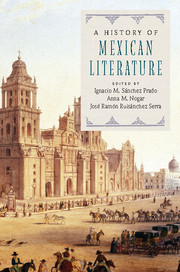Book contents
- Frontmatter
- Contents
- List of contributors
- Introduction
- PART I COLONIAL LITERATURE
- PART II THE NINETEENTH CENTURY
- 9 Early Nineteenth-Century Nation-Building Prose
- 10 The Emergence of the Mexican Literary Field (1833–1869)
- 11 The Rise of Cultural Institutions
- 12 Liberal Literat
- 13 The Conservative Paradigm
- 14 Mexican Modernismo
- PART III TWENTIETH AND TWENTY-FIRST CENTURIES
- PART IV MEXICAN LITERATURE BEYOND BOUNDARIES
- Index
- References
12 - Liberal Literat
from PART II - THE NINETEENTH CENTURY
Published online by Cambridge University Press: 05 July 2016
- Frontmatter
- Contents
- List of contributors
- Introduction
- PART I COLONIAL LITERATURE
- PART II THE NINETEENTH CENTURY
- 9 Early Nineteenth-Century Nation-Building Prose
- 10 The Emergence of the Mexican Literary Field (1833–1869)
- 11 The Rise of Cultural Institutions
- 12 Liberal Literat
- 13 The Conservative Paradigm
- 14 Mexican Modernismo
- PART III TWENTIETH AND TWENTY-FIRST CENTURIES
- PART IV MEXICAN LITERATURE BEYOND BOUNDARIES
- Index
- References
Summary
Introduction
It is not easy (and it is perhaps quite reductive) to assign a single unequivocal meaning to the word liberalism. It was an ideology and a political identity linked to party and factional struggles throughout the nineteenth century. Liberalism certainly did not mean the same thing for Manuel Payno (1810–1894), Luis Inclán (1816–1875), Guillermo Prieto (1818–1897), Vicente Riva Palacio (1832–1896), and Ignacio Manuel Altamirano (1834–1893). However, allow me to present a number of general points that can serve to roughly identify some of liberalism's defining problems (a broadly defined liberal “vision”) throughout the nineteenth century, especially from mid- to late nineteenth century, when the aforementioned authors were most active and produced their most important works.
Liberals were intent on creating a viable and modern nation-state. This was to mean a state that would exert continuous and homogenous territorial sovereignty and enjoy an uncontested monopoly on legal violence. Control of the territory would be coupled with the imposition of the nation as a cultural synthesis serving as the primary locus of affiliation, where inhabitants of a given territory would be, first and foremost, fellow citizens (in cultural if not always legal terms). Citizenship would serve as the primary identity marker; ideally, there would be equality before the law and a single legal system (based on a constitution), with no room for significant corporate privileges or differentiated legal status (such as those granted during the colonial era to the church, the military, and the Indians and Indian communities). This assault on corporate privileges would entail, of course, the separation of church and state, the nationalization of the vast church holdings not related to specific religious uses (these holdings were huge: it was reported that the church was both the largest landowner in rural Mexico and the largest holder of urban property in the major cities, as well as a powerful financial institution), and the comprehensive secularization of society. In order to achieve this, the state would erect an institutional infrastructure to carry out what was formerly performed by the church.
- Type
- Chapter
- Information
- A History of Mexican Literature , pp. 188 - 202Publisher: Cambridge University PressPrint publication year: 2016



